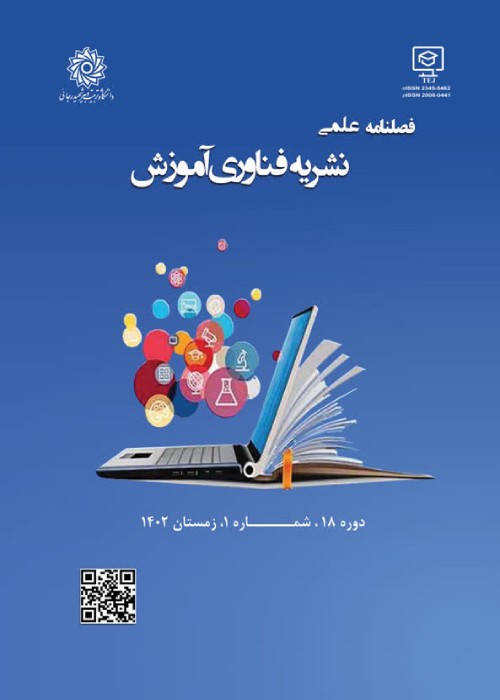Identifying and explaining the skills of academic staff members for virtual education in post-Corona: Providing a conceptual model
The use of digital technology for teaching and learning has been discussed for decades, but now and in the post-Corona era, due to the problems of the COVID-19 pandemic, it has become the focus of many educational institutions. The effect of COVID-19, in a short period, brought about a huge change in the way of education and learning and even completely blocked some educational activities. As a result, education administrators have turned to other alternatives to replace face-to-face or traditional learning. Virtual education is one of the very important and serious programs proposed and carried out by educational institutions in that era, now and in the post-Corona period. The quality of designing and providing virtual education, like face-to-face education, depends on several inputs such as the teacher, learner, technological tools and education design, financial resources system, educational policies, and so on. Among the listed factors, the lecturers of these courses are of special importance. Therefore, according to the change in the teachers’ role, their previous skills can no longer be answered, and teachers, in addition to acquiring the necessary skills in the traditional learning environment, need empowerment in various fields, which is the most important step in achieving this important identification. Today, few universities can improve and develop without providing training courses to empower their faculty members, and this is doubly important in the post-Corona period when universities place a lot of emphasis on virtual education. This is because in the Corona and post-Corona period the emphasis on virtual education in higher education and increasing its use, requires special knowledge, skills, and abilities for professors To achieve this, identifying the skills of lecturers in virtual education, it seems essential and paying attention to these skills will lead to the growth of professors and as a result, improve the quality of virtual education. In particular, there is no significant study for the post-Corona period in the context of the research topic, and there is no study on identifying and explaining the teaching skills of teachers for virtual education using the methods of content analysis and fuzzy Delphi. Therefore, the present study aims to identify and explain the skills of academic staff members in virtual education in the post-Corona period in a precise manner using the approaches of content analysis and fuzzy Delphi and presenting a conceptual model.
This research is an applied and descriptive research and the combined research methods of interview, content analysis, and fuzzy Delphi were used to collect and analyze information. The statistical population of the research is 20 experts and professors of the Shahid Bahonar University of Kerman. Data were collected through in-depth and semi-structured interviews. Then, all the interviews were analyzed with the method of content analysis, and the skills were extracted and identified. Then, skills were refined and explained in four survey stages using the fuzzy Delphi method.
In the interview with the experts, two main questions were used to measure the skills and competencies of academic staff members for virtual education in the post-Corona period. The results of the qualitative section included 452 initial codes, which were reduced to 31 main codes and five main categories after data reduction and merging overlapping terms. These five main classes include moral-social, technical-technological, educational-learning, individual-managerial, and supervisory-supportive skills. Then, with a questionnaire, 31 identified skills were examined for refinement and confirmation in four stages. By examining the skills, the experts approved all of them with the fuzzy Delphi approach.
In this study, it was determined that 31 skills are considered for virtual education teachers. In the meantime, we can safely say that 12 skills of social facilitation and appropriate counseling, conflict management, professional and ethical commitment, strategies and applications of learning theories, scholarly and research skills and knowledge sharing, skills to facilitate the teaching process, online lectures, encouraging and motivational skills, administrative and operational organizational skills, maintaining communication with students after completing the course, feedback, and monitoring learning activities, which were approved in the first round of the fuzzy Delphi method, are the most important skills of virtual education. Therefore, more emphasis should be placed on these skills in the post-Corona era in virtual courses.
- حق عضویت دریافتی صرف حمایت از نشریات عضو و نگهداری، تکمیل و توسعه مگیران میشود.
- پرداخت حق اشتراک و دانلود مقالات اجازه بازنشر آن در سایر رسانههای چاپی و دیجیتال را به کاربر نمیدهد.


